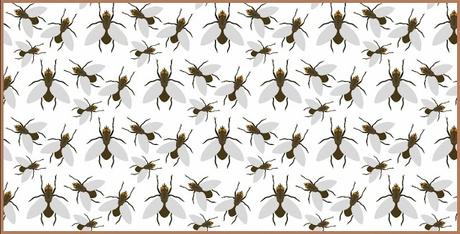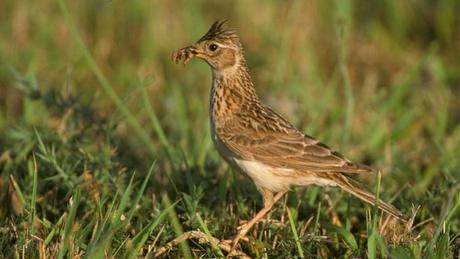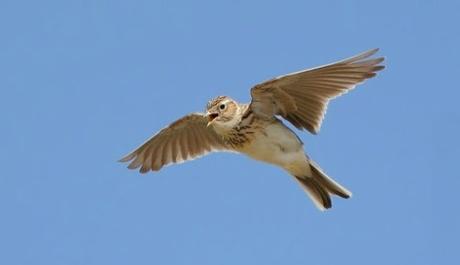Bugs are an important part of the planet's ecology and are a vital element in a complex food chain that sustains all manner of diverse life forms including farmland birds. Unfortunately, the right sort of bugs are disappearing fast and it's all our fault.

Over half a century ago, E.B. White, author of the brilliant children's story 'Charlotte's Web' made this sage pronouncement: "Our approach to nature is to beat it into submission. We would stand a better chance of survival if we accommodated ourselves to this planet and viewed it appreciatively instead of sceptically and dictatorially."
He was an inspiration to Rachel Carson, whose own treatise 'Silent Spring', published in 1962, did so much to raise awareness of the damage being done by the unregulated use of pesticides, DDD/DDT in particular. Carson's book was quite probably the main catalyst of the whole ecological movement of the last fifty years.
I joined Friends Of The Earth in the early 1970s as the first wave of concern for what our parents' generation was doing to the planet swept across the western hemisphere - and for a while it appeared that consciousness-raising was having a positive effect and the silent spring might be avoided. A range of the more destructive pesticides was banned (including DDT); there were pan-global treaties and regulations aimed at arresting the tendency to beat nature into submission; subsidies were agreed for food producers adopting 'green' principles and organic approaches.
However, the stark and awful truth of the matter is that the such changes were largely token. The dictates of agribusiness have been driving us relentlessly towards more intensive farming practices which are decimating the insect and by extension the bird population.
The volumes of insecticides sprayed onto farmland have increased enormously in recent years and the chemicals themselves are becoming more potent. Add to that changes in farming patterns - removal of hedgerows, a tendency to monoculture, more intensive crop growing (earlier planting, two crops per year) and two very unfortunate things happen: the flying insect population which is the staple food of farmland birds is hugely reduced - down by 75% in the last twenty years - and the habitat that skylarks (and linnets, partridges, yellowhammers) traditionally live and breed in is also disappearing fast.
The alarming result of this double-whammy across the whole of western Europe is a rapid and escalating decline in farmland bird populations. The French National Museum of Natural History has conducted a nationwide survey and when it analysed the findings declared bird numbers to be at a "level approaching an ecological catastrophe"; the RSPB in the UK reported in 2015 "our beleaguered farmland birds have declined by nearly 60%. We need urgent action."
Already the beautiful skylark (see below), so long a symbol of pastoral England, has disappeared completely from large swathes of the south, East Anglia and the midlands.

Insectivorous but endangered skylark
After not having heard one for years, I was lucky enough to see and hear a skylark just the other Sunday morning as I was out walking by the Wyre estuary a few mile from Blackpool. It was a thrilling encounter. The bird flew up from the sedge and started to sing as it climbed into clear blue sky, spiralling higher and higher until it was a black speck showering the countryside with exuberant song for a good twenty minutes. I knew then that I was going to try and capture the experience in a poem as soon as the opportunity presented itself - and here it has, courtesy of insects!

Showering the countryside with song
For the sake of the skylark, I will join the fight for the right kind of insects - that means working to restore traditional structures in the countryside: replanting hedgerows, leaving grass margins around fields, growing hay in the old-fashioned way. It can be done in tandem with high yield crops, when farmers work with wildlife and not against it, just as E.B. White advocated. The charitable Countryside Restoration Trust is proving the point at its model Lark Rise Farm in Cambridgeshire.Such projects have to succeed. Otherwise the dreaded day might arrive when there will be no more larking about in our skies, only silence and the ghosts of past glories at heaven's gate.
Riffing On High
First hint of spring, walking by Wyre,
you're still here, as am I.
That's a relief.
These are the good days
of golden dawns and azure mornings.
I know why your soul soars,
crested skylark king,
spiralling empyrean
to the fifth harmonic circle of heaven,
fanning away on quivering wing
rapid as a heartbeat
until you're a mere black speck
above the sere,
from where you shower us
with exuberant song,
a twenty-minute long
skylarking riffing on high
that fills the estuary.
Rooted to the spot as am I,
your dazzling symphony of joy
makes my soul soar too.
These are the good days.
We're glad to be alive.
Thanks for reading, S ;-) Email ThisBlogThis!Share to TwitterShare to Facebook
Reactions:
